VIDEO PREMIERE & WEB-EXCLUSIVE INTERVIEW
Musician: RANDALL BRAMBLETT
Music Video: “Garbage Man”
RANDALL BRAMBLETT DEBUTS “GARBAGE MAN” FROM NEW ALBUM JUKE JOINT AT THE EDGE OF THE WORLD—OUT JULY 7 ON NEW WEST RECORDS
Critically acclaimed singer-songwriter and multi-instrumentalist Randall Bramblett is releasing his 11th studio album Juke Joint at the Edge of the World early next month. Combining elements of soul and funk, Bramblett marries profound lyrics with heart-thumping soulful melodies inspired by old southern music clubs—juke joints.
“Some of the places we play are like the old juke joints where people dance and shout,” Randall explains. “From these people and places we find the energy we need to be free to shake the music up.” He attributes the creative evolution of this 10-song collection to the bond he shares with his bandmates. This record “reflects the freedom that my bandmates and I have found in the last few years of playing together.”

Photo credit: Ian McFarlane
Highly sought-after for his creativity as both a collaborator and skilled touring sideman, the legendary Georgian’s talent has earned him the respect of his peers and many of rock’s finest luminaries. While having shared stages with Steve Winwood, Bonnie Raitt, The Allman Brothers and Widespread Panic, Bramblett will be on his own tour through the summer supporting the new record that has a live in-the-studio feel to it. “The music is rooted more in the soul and R&B dance music I grew up listening to and playing. The songs will take you places that make you dream and dance.”
Juke Joint at the Edge of the World will be released on July 7 (New West Records), and it is one of the most soulful albums Randall Bramblett has ever recorded. The music thumps at your heart, grabs your soul, and makes you want to get up and dance.
We talked with Randall Bramblett about his incredible career in music, the recent passing of Gregg Allman, his new soulful album, and how he continues to push the boundaries while remaining authentic to find his voice and his true center.
RANDALL BRAMBLETT Web-Exclusive Interview
with M Music & Musicians magazine publisher, Merlin David
How did the idea of “Garbage Man” come to you?
“Garbage Man” comes from memories of growing up in a small South Georgia town. I was thinking about the huge gulf between the classes and the races that formed the background of everyday life there. Everything was at once familiar and totally beyond my understanding. It’s also about that disconnect—of living in a small town. Small town living can feel both safe and isolated. I felt like I knew everyone and yet there were huge swaths of the population I never knew. Idyllic—and romantically out of touch. The “Garbage Man” represents the reality behind the illusions of small town life in the South.
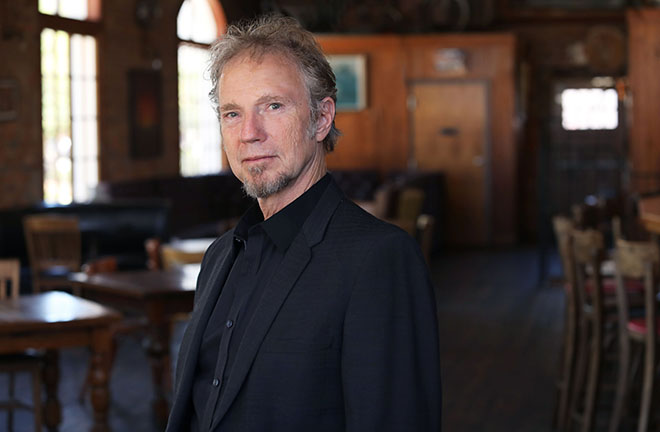
Photo Credit: Ian McFarlane
Tell us how this new album Juke Joint at the Edge of the World evolved.
I’ve been playing with my four-piece group—that I love, and they provided the direction for this new record. Playing with them inspired me. For this record, I decided to mainly feature this four-piece group—trying to capture that quartet feel. After four or five years together, we are at the point where we can read each other’s minds. A lot of this record reflects the flow and how we react to each other. I did my vocals at home, which I’ve never done before, but it’s pretty much live. We just did it in the studio, and it felt so good. It’s got an organ quartet sound from the 70s, like Les McCann or Eddie Harris. But it’s also got the craziness and edginess of what I like to do lyrically and sonically. It’s a mix of the old and new.
How did this album differ from the previous album?
The last record was Devil Music. My process is to keep writing, and let the songs lead the way. These songs are fun, funky but crazy lyrics. The songs, musically, came out of the live performances with the quartet—that’s what inspired me musically. The last album was pretty dark and heavy, and powerful to do. I wanted to keep this album simpler.
Where were these live performances?
We’ve been playing a lot of places like Bradfordville Blues Club, outside Tallahassee, FL. It’s an actual juke joint in the woods—with historical marker. It was an after-hours joint for Ray Charles, the Negro League baseball team and others. An old concrete block place they fixed up—got the vibe. We play places where people dance. That’s given me energy these past couple of years. Some of these songs came out of that energy—they’re danceable, they’re fun. I like to see people dance, and I like to play funky music.
Is this a change from the music you’ve been doing?
Not too long ago, I went through a period where I was doing Americana. Not strictly, but it had that leaning—more folky, Americana. But since this group, it’s just been fun to watch people dance and have a big time. And these songs came out of that music.
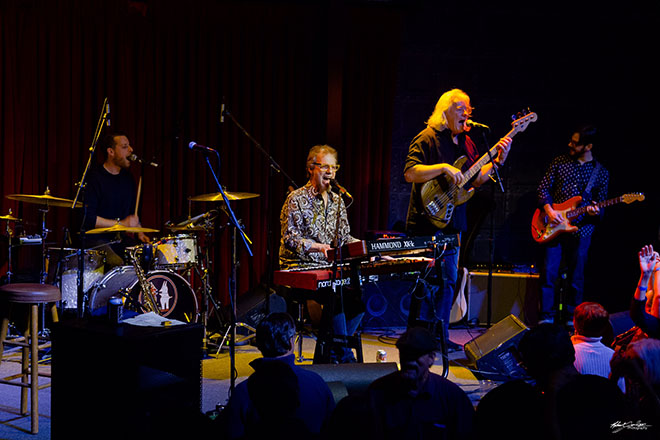
Photo credit: Nolan Terrebonne
What is your creative process for writing songs?
I try to journal a little bit every morning. I read a couple of meditation books—recovery stuff. Sometimes ideas or visuals, a few words or feelings, maybe a paragraph—I put that in the back of the book. Eventually, I take those down to my studio and get out a guitar or maybe a keyboard. I usually write on electric guitar because I don’t play one very well. My hands don’t know where to go—that helps me not go to the same places. I usually run a loop program I’ve used for years, ACID, just to get an ambient sound or a rhythm to get things going. I sing these words to that rhythm, and it sparks other words—until a song emerges. I never have the whole thing planned or written. I just follow the thread of the idea of a scene or vignette, and let that tell me where the song is going—and what the song is about. I’m not like a Nashville writer. I usually don’t know what I’m going to write about.
Tell us one experience where something unique inspired you to write a song.
For a song like “Hate to See You Go”—which was on Rich Someday. It starts out, “Big green moth on a window screen” which is what I saw one night. “So still and resigned” is the next line. A metaphor for letting someone go—hating to see them leave. I am looking at the moth saying “I guess you’re ready for anything that comes down the lonesome line.” And that led to, “Whatever happens, it will be alright. Guess I’ll take my lesson from the moth tonight.” I live out in the woods, and I see stuff like that. We also had a big drought, and that became a metaphor for drying up spiritually, relationships drying up. I hear things in meetings that really grab me. I heard somebody say, “I’m all prayed up—but I still wanted to drink.” I used “prayed up” on one of the songs on this new record—“All Prayed Up.” I love to hear phrases like that—Southern and so beautiful.
Any other songs like that on this new album?
“I Just Don’t Have the Time” is funny because I’m rambling on about somebody who is bugging the hell out of me—or the person talking. It came from a story I heard in Nashville. During a session, this big time producer was being bugged by a new guitar player trying to weasel his way into a session. He was all talk, talk, talk. Finally the producer turned to him and said, “I’d like to get to know you, I’d like to be your friend—but I just don’t have the time.” (Laughs)
What songwriting tip would you like to offer?
Writers need to pay attention to the world around them and to their interior world too. Try to be aware of what’s going on. Make note of it, so you can use it—whatever brings up a feeling, or maybe a metaphor. Make note of it. Be aware of it. Pay attention to your inner and outer surroundings—to your environment. The other thing is showing up, and making time for writing. In the old days, people used drugs to make them write something. Sometimes it was good, and sometimes it wasn’t. ‘Oh we need 10 songs for a record, let’s get high and write.’ I can’t and don’t want to do that anymore.
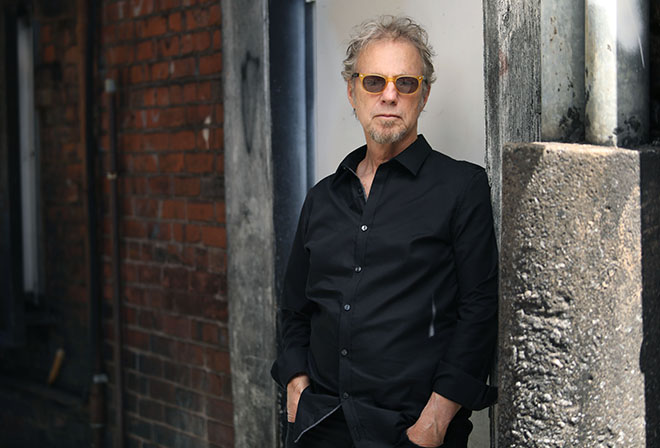
Photo Credit: Ian McFarlane
Is songwriting difficult?
I have to show up, and it’s not always fun to make time for inspiration. Songwriting is frustrating as hell sometimes, but I’ve learned that if nothing’s happening, or I’m lyrically up against a wall, I leave it and take a walk and come back. When I hear the recording again, I may think—that’s pretty good. I don’t want to beat it over the head and capture it that way. I want to lure it into the cage. (Laughs)
Are you the cage?
The album’s the cage. Once you capture it on an album, you’ve got it for all time. Funny, but I’m now thinking about all these armadillo traps that I set around my house. I’m luring them into the cage. (Laughs) Songwriting and the whole creative process is mysterious. I can’t guarantee that if I come down here I can write it—even if I try really hard. Some days it’s there, and some days it’s not. Most of the time, it’s frustrating. For others, it comes easier. After I write it, and record it—the satisfaction is great.
Tell us about one unique songwriting experience.
I dreamed one song on this last record. It might have been the first time I’ve done it—the words, and the melody. It starts, “40 buzzards on the cell tower.” I did see a ton of buzzards on a cell tower when I was walking through the woods—hell of an image. You can imagine if your phone rang, you wouldn’t want to take that call. (Laughs) It’s like death. The song goes, “Man, I wouldn’t take that call.” And the chorus, “Mali katra, mali sutra”—who knows what that means. I used an Indian phrase of some type that means mysterious spirit—always hiding in the background, always hiding in the everlasting daylight.
Strong lyrics.
I’m almost 69, so I’m thinking about death. Some of these songs are—what’s it going to be like? Where are we going? How will it be not to exist? Do you fight it? It’s just mortality. That song has some deep, strong lyrics.
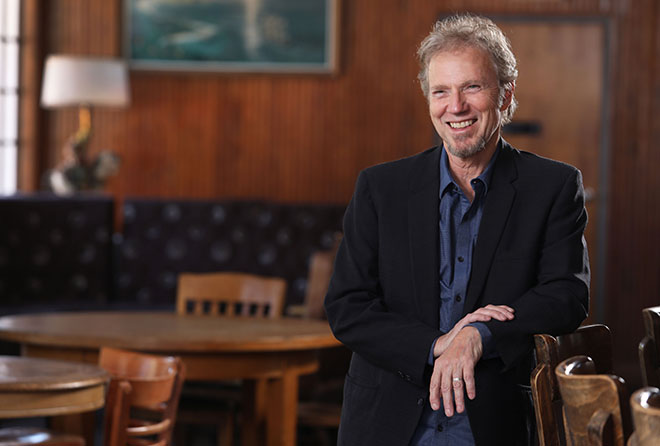
Photo Credit: Ian McFarlane
You did a cover.
I rarely do covers, but the record company and my agent—they’re always saying: you should do a cover. This time I thought it would be fun to cover a song I really like—Beck’s “Devil’s Haircut”—it seemed to fit with my musical vibe. We put horns on it. It’s pretty funky.
How do you keep things interesting?
On the last record, I used some guests: Mark Knopfler, Derek Trucks and Chuck Leavell. I hadn’t done that before, so I thought I’d try it. I’m trying to do something a little different each time—push the boundaries. It’s a real honor to have all these guys play.
Tell us about working with Chuck Leavell and Sea Level.
We met in Macon—on a session. We started off in the Allman Brothers Band. I needed to do more work. We joined Sea Level, and I brought Davis Causey with me. We did several records with them. We thought we’d come up with a different sound—especially the Southern jazzy thing. It was fine for a couple of records but we just ran out of steam. The drugs and alcohol were excessive—for me, and we lost inspiration. The record company, Capricorn, folded. But Chuck and I remained close. We’re playing in a couple of weeks.
Sad news about Gregg Allman this past weekend.
I’m missing Gregg these days. I sent him a text a few weeks ago but never heard back. I thanked him for taking me on his first two solo tours. They were my first national tours and I’ll never forget them. We had a big production with stage props of moss and southern swamp scenes on Plexiglas. We also took an orchestra of what seemed like a hundred crusty union string players who also played poker between songs in rehearsals. I can remember being thrilled and intimidated when we played Carnegie Hall. How was it possible I was standing on that stage? We had a private plane for traveling fast and partying hard. That was my intro to that world too.
How did Gregg’s music influence you?
Watching Gregg play “Oncoming Traffic” night after night on the big grand piano showed me what he could accomplish with just his voice and soul. Powerful stuff for a kid from south Georgia. I watched him play his soulful Hammond and memorized his drawbar settings. His voice became a model for how blue eyed soul could be authentic and original—not just imitative. His influence on all of us upcoming southern songwriters and vocalists just can’t be overestimated.
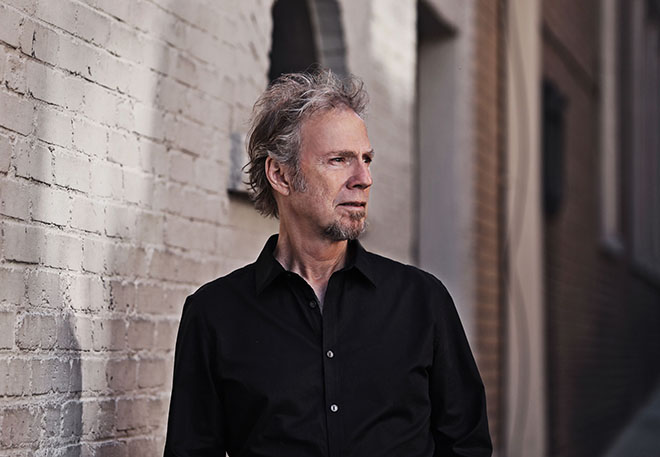
Photo Credit: Ian McFarlane
Who inspired you to write songs?
I was a big Dylan fan since high school—learned all the songs on guitar. I wasn’t planning on being a professional musician. I was in college—thought I’d be a scientist or psychologist. (Laughs) I liked religion. I got accepted to Seminary, but I heard guys like James Taylor (big reason I had a guitar), Van Morrison, Leon Russell, and got interested in songwriting. I was a senior in college trying to write songs—sounding like James Taylor. Later I started writing funkier, like the soul band I was in. I was trying to find my voice—moved to Athens, and met some writers there. After I wrote a few songs, I thought—maybe I could do this. I didn’t go to Seminary. I decided I’d try to be a songwriter and a musician.
Which Seminary?
I got accepted into Harvard. This was college religion classes in Chapel Hill, but I liked them a lot. I identified with studying psychology and religion together. I got a high draft number, so I wasn’t going to Vietnam. Religion interested me, and I thought going to Harvard would be so cool. It was a fork in the road. I was tired of school and the academic thing and picked going down to Athens to play music. I wanted to be a songwriter and have some fun. (Laughs)
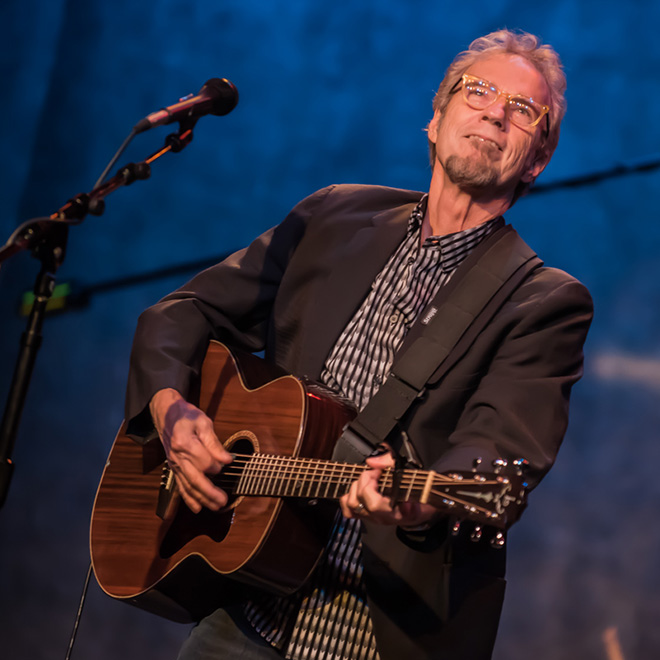
Randall Bramblett with his Lichty Guitar
What instruments can you not live without—that helps you write, record or perform?
Definitely Lichty Guitars. When Jay built that guitar for me, I wasn’t a solo performer. But the record company needed me to go to radio stations and promote the record. I had to play solo and duo acoustic guitar things—and I’m not a great acoustic or electric player. But when Jay built that guitar for me, it gave me the motivation I needed. It was a really good guitar. I needed to get it together and work on being a good guitar player. I’m more comfortable and it seems like this is my instrument. It’s a beautiful instrument, and it sounds great. Something about him building this for me—it gave me the confidence to be a better solo musician.
Other guitars?
I write a lot with a guitar called the Tradition Jerry Reed model. It’s a beautiful guitar—like a tele with a whammy bar and a special mechanism that keeps it in tune. It gives a big ringing ambient sound. I think I met the guys at a Bonnie Raitt show I was playing, but I got it in Florida. I use it to get odd distortions and echoes. But I would never try to play electric guitar in a session. Writing with it gives me inspiration because of the sounds I can get out of it that I cannot get out of an acoustic guitar.
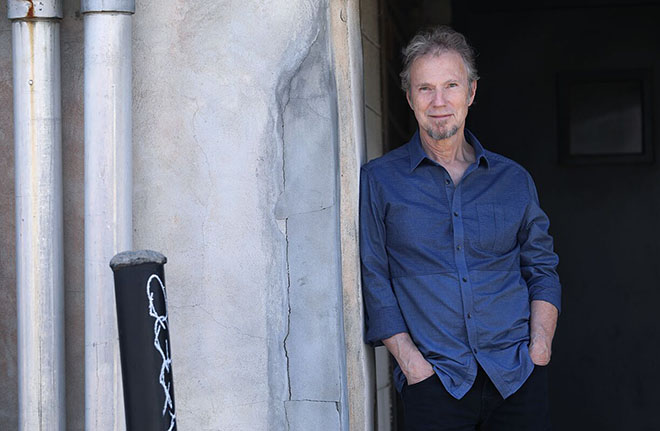
Photo Credit: Ian McFarlane
And piano?
I use the Nord Stage 2. It’s wired into the Hammond XK-1C. I hook them together so the Rhodes piano sounds and organ play simultaneously—triggered at the same time. It’s a unique sound I developed over the years—where you hit a chord, and sustain the piano, and you get a whispery organ sound that continues. It’s a cool thing. I used it on almost every song on this last record.
How did your signature sound develop?
I was trying to do organ and piano at the same time—on a lot of songs. I had to learn how to midi them together. You can’t play everything you want to play. The piano part would not be a good organ part, and vice versa. You had to find a middle ground where things work for both instruments. I like hearing what I’m doing right now, so I’m going to keep on doing it.
What PRO are you with?
I’m with BMI.
Do you remember the first time you heard one of your songs on the radio?
It was Sea Level’s 1977 “That’s Your Secret” —it did well and climbed up the charts. I was probably in a fog, having too much fun—but it was exciting to hear it on the radio. I hear my songs now on cable, and that’s always nice.
 Top 5 Musicians who inspired you to become a musician?
Top 5 Musicians who inspired you to become a musician?
It was early rock ’n’ roll, people like Jerry Lee Lewis. Then I discovered Ray Charles and James Brown—they continually are my inspiration. Then Bob Dylan, Van Morrison and the Beatles showed me lyrics —you can write about things other than moon, June and love affairs. You can write about anything. They opened the door to write about things meaningful to me—to expand my mind and not just write about things that people thought were acceptable, or what lyrics should be about and what music should sound like. That’s a great gift Dylan and the Beatles gave everybody. These days, the soul music I grew up with is just sticking with me more than the folk music. I’m diggin’ the live playing and the band. I’m enjoying it so much—always fun and funky and beautiful. I’ve gone back to my roots. I was always in a soul band—trying to be black and sing like the black people I love. That’s what’s guiding me these days—what I really love. Hard to beat those old records.
Tell us about some of your favorite albums.
Live at the Apollo (1963) – James Brown – was a life changer.
Genius + Soul = Jazz (1960) – Ray Charles – all the early ones really moved me and still do.
Etta James, Howlin’ Wolf, Son House, Muddy Waters—all of it.
The Blues is just through everything—it’s a foundation. I heard them, but didn’t pay much attention, but I am now.
Have you played with people you admired?
There have been a few who really moved me. When I was in college, I listened to Traffic. In 1988, I recorded with Steve Winwood, who is one of my favorite singers. I played with him for the next 16 years. He’s a consummate professional. His voice is just as good as it was when he was 16. He plays the organ, and I learned a lot of that from him. I played with Bonnie Raitt, and she’s the same way—gets better and better. Her generosity and support of songwriters like me is amazing. She opened my eyes. You can be a big star and be generous and supportive of other people. It’s beautiful. She’s a natural at it. I honestly love singer-songwriters—people who write songs like she does. Roger Glover, the bass player for Deep Purple, heard my stuff and called me. I went up to Connecticut and did a couple of records with him. So many amazing musicians.
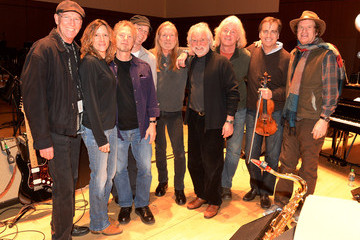 Best advice someone has given you.
Best advice someone has given you.
Write from the heart, don’t get too clever, don’t get too much in your mind—play music from your heart. To me, it meant to not plan it out too much. Don’t get too intellectual about it. That was good advice. I have to suit up, show up, and keep doing it—persistence. Write things that mean something to you. Don’t worry about what it means to anybody else—or you get hung up trying to please other people. Write from your heart and trust it’s going to get through. I always have to remember that. I’ve sold a lot of records, but I’m not that well known. I have to trust that what I’m doing pleases me. I know it’s going to please some people, but not a lot. I have to trust that it’s OK. You have to define your own success.
Best advice you’d like to give.
Keep after it. It’s not easy to be a successful or recognized musician, but success should be defined as what pleases you. Keep pushing to do something different every time. I don’t want to do the same old things I’ve been doing on other records. I like to push the boundaries each time.
What’s next?
It’s always exciting to get a new album out and see what the response is going to be—to see if anyone likes it. (Laughs) See if radio plays it. Like anything else, it’s exciting for a while, but shiny things get dull with time. I usually try to keep my expectations low. (Laughs) Let it be what it is. I just have to trust that it’s a good record. It comes out July 7, and we’ll see what New West can do with it. I have to believe in them. I turn it over to them, and play live as much as I can—and get the word out there.
What did you learn while doing this record?
I feel like I’ve found my voice—musically and lyrically—I’ve found my true center. And it’s authentic music. Even when it’s someone else’s voice in a song, it feels authentic to me. I think that’s a good place to be, and I feel good about it.
Where can your new fans get more info and stay updated?
RandallBramblett.com
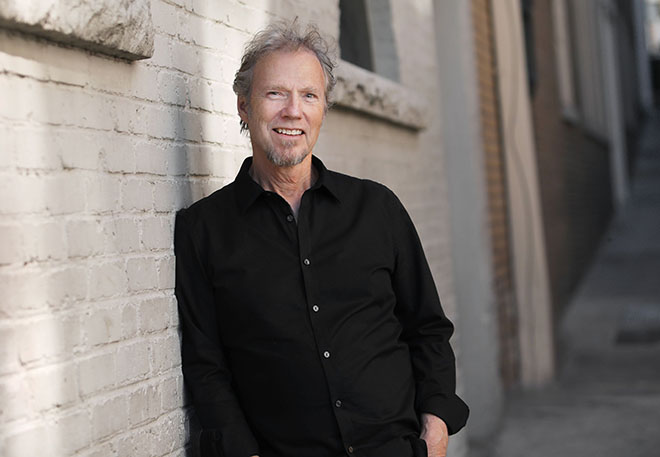
Photo credit: Ian McFarlane



comment closed